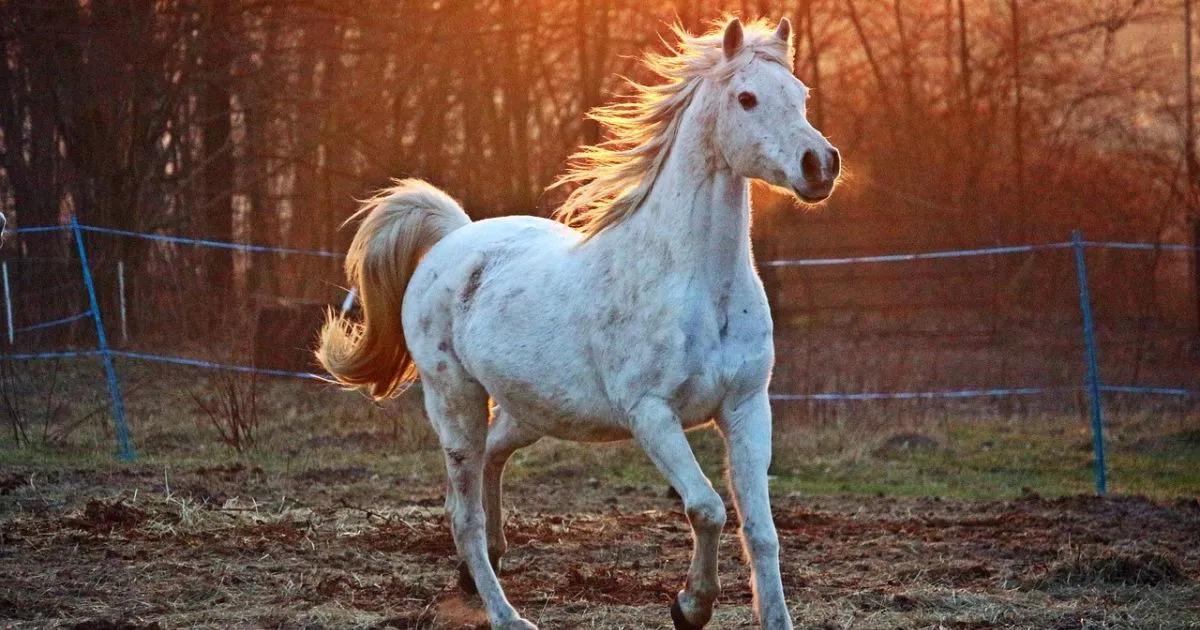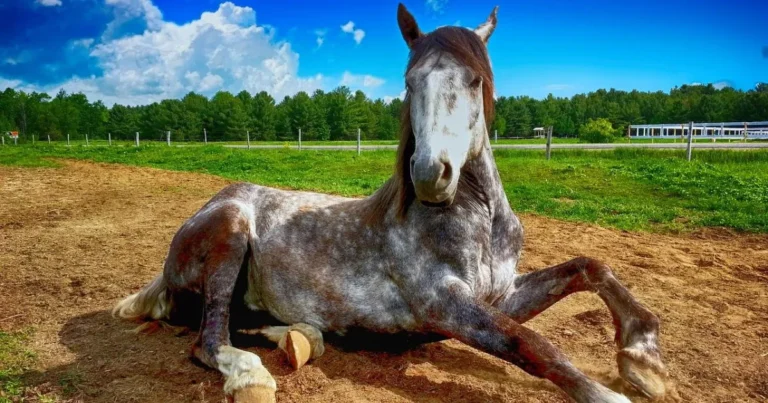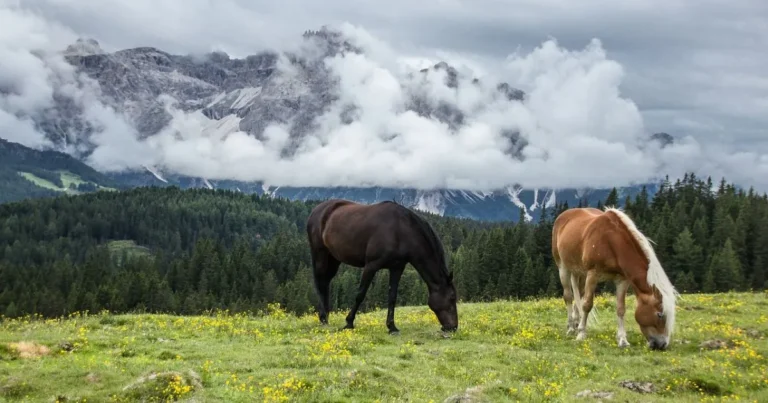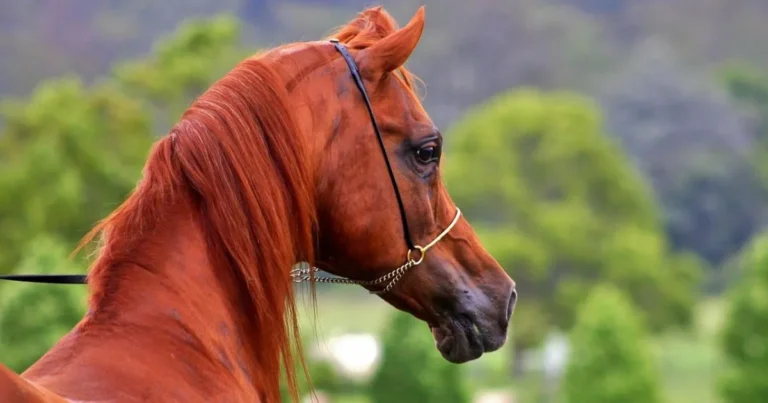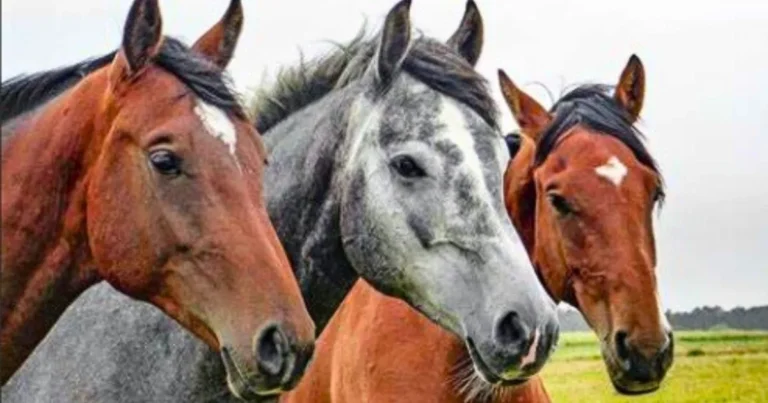Horse Age in Human Years: Simple Chart & Facts
Table of Contents
Horse Age in Human Years: Simple Chart & Facts
Ever wondered how your Arabian horse’s lifespan compares to your own life journey? Understanding horse age in human years isn’t just a numbers game—it’s about connecting with these majestic creatures on a deeper level.
Horses age differently from humans, with their early years racing by and later stages moving more slowly. Each stage of a horse’s life brings unique challenges and incredible transformations that mirror our own human experiences of growth and maturity.
While comparing horse and human years isn’t an exact science, it provides valuable insights into their development. Knowing how horses age helps you provide better care, anticipate health needs, and appreciate the remarkable journey of these intelligent companions.
From playful foals to wise senior horses, every stage tells a story of resilience, strength, and the beautiful complexity of equine life. Your understanding of their aging process can make a significant difference in their health and happiness.
Understanding Horse Age Conversion Basics
Figuring out a horse’s age is more than just counting years. Arabian horses, like others, age differently than humans. Knowing these differences is key to giving your horse the best care.
Why Horse Years Differ from Human Years
Horses grow up much faster than people. They develop quickly in their early years. Here are some important differences:
- A 1-year-old horse is about as mature as a 6-7-year-old human
- Horses reach full physical growth much sooner than humans
- They become sexually mature between 12-24 months
The Importance of Age Calculation in Horse Care
Getting a horse’s age right is vital for their health. Knowing how long Arabian horses live and their age-related needs helps owners care for them better.
| Horse Age Stage | Approximate Human Equivalent | Key Characteristics |
|---|---|---|
| Foal (0-1 year) | 0-6 years | Rapid growth, high energy |
| Yearling (1-2 years) | 6-12 years | Continued development, learning |
| Young Adult (2-5 years) | 12-25 years | Peak physical condition |
Key Factors in Horse Age Assessment
Several important factors help veterinarians and owners figure out a horse’s age and health:
- Dental condition and tooth wear
- Physical development milestones
- Breed-specific aging patterns
- Environmental and nutritional impacts
Understanding your Arabian horse’s unique aging process ensures you can provide the most appropriate care at every life stage.
Horse Age to Human Age Conversion Chart
Understanding how to convert horse age helps you grasp your equine friend’s life stages. Horse years are quite different from human years. This makes it important to get their age right for their care and management. Arabian horses need special attention when figuring out their age.
A detailed horse age conversion chart gives you a peek into your horse’s growth stages. Unlike simple comparisons, converting horse age involves complex calculations. These take into account several factors.
- Foals grow much faster than human babies
- Horses reach physical maturity around 4-5 years old
- They are at their best between 5-15 years
Here’s a detailed look at horse age conversion:
| Horse Age | Human Age Equivalent | Life Stage |
|---|---|---|
| 1 year | 18 years | Late Teenage |
| 5 years | 35 years | Adult Prime |
| 10 years | 45 years | Middle Age |
| 20 years | 60 years | Senior |
| 30 years | 85 years | Elderly |
Remember, a horse’s health, breed, and care greatly affect how they age. Arabian horses might age differently than other breeds.
“Age is not just a number when it comes to horses—it’s a complex journey of development and care.” – Equine Veterinary Experts
Your horse’s age conversion offers insights into their diet, exercise, and health needs. Regular vet visits are key to tracking your horse’s aging process.
Early Development: From Foal to Young Adult
The journey of horse development is truly amazing. It’s a time of fast growth and change. Knowing about the different stages helps owners give the best care to their horses. Arabian horses, with their special traits, go through a unique growth process.
Newborn foals grow and develop quickly. They show amazing abilities right after birth. This surprises many people who love animals.
First Year Milestones
In the first months, foals hit important milestones:
- Stand and walk within 30 minutes of birth
- Begin nursing right away
- Start eating solid food around 2-4 weeks
- Grow strong and coordinated fast
Physical Development Stages
Horses, especially Arabian ones, grow in a special way. Their growth depends on food, genes, and their environment.
- 0-3 months: Quick weight gain and muscle growth
- 3-6 months: Better movement and play
- 6-12 months: Big growth in height and muscle
Mental Maturity Timeline
Horses also grow mentally. They learn social skills, understand their herd, and get smarter. By one year, they can solve complex problems and show emotional smarts.
Knowing about these early stages can really help your horse’s health and future.
Adult Horse Years Explained
When your horse reaches physical maturity around age 5, they enter a fascinating stage of life. This stage defines their peak performance and potential. The adult years are the longest and most dynamic in a horse’s life. This is especially true for breeds like Arabian horses, known for their remarkable longevity.
During the adult horse age, you’ll notice significant changes in your horse’s physical and mental capabilities. Horses typically experience their prime between ages 5 and 15. During this time, they show:
- Peak muscular development
- Maximum athletic performance
- Optimal mental responsiveness
- Strongest bone density
Arabian horses stand out with unique characteristics during their adult years. Their genetic makeup often contributes to an extended period of activity and robust health. These magnificent animals can maintain exceptional fitness levels well into their late teens and early twenties.
“A well-cared-for horse is like a fine wine – they only get better with age.” – Equine Veterinary Expert
Understanding your horse’s adult stage helps you provide targeted care. Regular veterinary check-ups, balanced nutrition, and appropriate exercise become crucial. They help maintain their health and extend their productive years.
Your horse’s adult phase is not just about physical capabilities. It’s also about nurturing their overall well-being. Paying attention to their changing needs ensures they remain happy, healthy, and active throughout this critical life stage.
Understanding Arabian Horse Lifespan
Arabian horses are known for living long lives. They often live longer than many other horse breeds. This makes them very popular among horse lovers and breeders.
Several important factors affect how long Arabian horses live. These amazing animals usually live between 25 to 30 years. Some even live longer than that.
Genetic Foundations of Longevity
The genetics of Arabian horses help them live longer. They have special genes that give them:
- Strong immune systems
- Good heart health
- The ability to adapt well to different places
Essential Care Requirements
To help Arabian horses live a long life, they need special care. You should:
- Take them to regular vet check-ups
- Feed them a balanced diet that meets their needs
- Make sure they get enough exercise and mental challenges
- Keep their teeth and hooves in good shape
Genetics are important, but care is key to a long life. Your effort in caring for them greatly helps their lifespan.
“The Arabian horse is not just a breed, but a living testament to resilience and enduring vitality.” – Equine Research Institute
Senior Horse Age Considerations
As your Arabian horse gets older, it’s key to understand the aging process. Horses are usually seniors around 17 years old. But, this can change based on breed and health.
Knowing the aging challenges helps keep your horse’s life quality high. Senior horses face several changes that need special care:
- Decreased immune system functionality
- Reduced muscle mass and strength
- Potential dental and digestive challenges
- Increased susceptibility to age-related health conditions
Your Arabian horse’s care should include regular vet visits and special nutrition. Regular health assessments can help identify and manage age-related issues early. Work with an equine vet to create a care plan that fits your horse’s needs.
Diet is very important for your senior horse’s health. Special senior horse feeds are easier to digest. They help keep your horse in good shape. As dental wear increases, soft feeds may be needed to ensure your horse gets enough nutrition.
- Increase fiber-rich foods
- Monitor weight carefully
- Supplement with vitamins and minerals
- Adjust feeding frequency
Regular, gentle exercise is still important. It helps keep your horse mobile and healthy. Talk to experts to create an exercise plan that’s right for your senior Arabian horse.
Factors Affecting Horse Aging Process
To understand how Arabian horses age, we must look at many factors. These include genetics, environment, nutrition, and care. Each one is important for your horse’s health and longevity.
Genetics are key in determining a horse’s lifespan. Arabian horses, for example, can live long and healthy lives with the right care.
Breed-Specific Aging Characteristics
Arabian horses have unique aging traits:
- They age slower than other breeds.
- They keep their muscle tone well into old age.
- They adapt better to environmental changes.
Environmental Influences on Aging
Your horse’s living conditions affect how long they live. Stress, climate, and where they live can speed up or slow down aging.
- Living in a calm, consistent place helps them live longer.
- Staying in a moderate temperature range is good for aging.
- Good shelter protects them from harsh environments.
Nutrition and Longevity Connection
Good nutrition is crucial for Arabian horses as they age. Their diet needs change, so it’s important to manage their nutrition carefully.
- They need high-quality protein to keep their muscles strong.
- Mineral supplements help prevent age-related problems.
- They need the right amount of calories as they get older.
By understanding and managing these factors, you can improve your horse’s life and how long they live.
Life Stage Comparison: Horses vs. Humans
Looking at the horse vs human age comparison shows interesting differences. Humans take almost 20 years to grow up. But horses grow up much faster.
Let’s explore the main differences in life stages:
- Horses reach physical maturity around 5 years old
- Humans typically mature around 20 years old
- Arabian horse years show even faster development
Horses grow up quickly, which is a big challenge for their owners. A 5-year-old horse is like a human in their early twenties. They are fully grown and ready for complex tasks.
“In the world of horses, time moves differently than in human years” – Equine Development Expert
Different breeds of horses age at different rates. Arabian horses, for example, live longer and stay healthy longer. Their genes help them stay in top shape for more years.
- First year of a horse = 15 human years
- Second year of a horse = 9 human years
- Each subsequent horse year = approximately 5 human years
Knowing these differences helps you care for your horse better. It also lets you appreciate their special life cycle.
Common Misconceptions About Horse Age
Understanding horse age can be tricky. Many people rely on simple methods that are not accurate. The idea that one horse year equals seven human years is wrong.
Let’s look at some common myths about horse age:
- Myth: All horses age at the same rate
Different breeds, like Arabian horses, age differently. Genetics, care, and environment affect how long they live.
- Myth: Horse age can be calculated by simple multiplication
Vets warn against using simple math like multiplying by 3 or 7. Horse aging is complex and depends on many biological factors.
- Myth: Older horses cannot be active or useful
Many horses stay healthy and useful well into old age with the right care. Some Arabian horses keep performing well even in their later years.
Understanding horse age is more than simple math. Each horse ages differently based on breed, health, and lifestyle. Always ask a vet for an accurate age assessment.
“Not all horse years are created equal. Understanding their true aging process is key to providing optimal care.” – Equine Health Experts
By clearing up these myths, we can better care for horses. We can also appreciate their amazing aging journey.
Tips for Promoting Healthy Horse Aging
Keeping your horse healthy and long-lived needs a full plan. By using smart preventive steps and knowing your horse’s needs at each stage, you help them stay well. This is key for their health at any age.
Preventive Care Essentials
Regular vet visits are key to catching health problems early. Your horse care plan should include these preventive steps:
- Schedule annual comprehensive health examinations
- Maintain updated vaccination protocols
- Conduct regular dental checks and cleanings
- Perform routine parasite screenings
Exercise and Activity Guidelines
Right exercise is vital for your horse’s health. Adjust workout intensity based on your horse’s age and condition. Older horses need:
- Low-impact movement activities
- Gentle stretching routines
- Controlled walking exercises
- Regular but moderate physical engagement
Dietary Considerations for Optimal Aging
As horses get older, their diet becomes more important. Change your horse’s diet to meet their changing needs and keep them healthy:
- Provide senior-specific feed formulations
- Ensure adequate protein and fiber intake
- Monitor weight and adjust caloric consumption
- Supplement with age-appropriate vitamins
By following these care tips, you can greatly improve your horse’s life and maybe even their lifespan.
Conclusion
Understanding horse age is more than just numbers. It shows the detailed growth of horses, from the Arabian horse lifespan to aging factors. Each horse is unique, needing special care that goes beyond age.
Horse age isn’t just about charts. Knowing your horse’s breed, environment, and health needs is key. Good nutrition, exercise, and care are essential for their well-being.
Every horse ages differently. While guidelines help, your care makes a big difference. Be patient and learn about each stage of your horse’s life.
Regular vet visits and learning are crucial for your horse’s long life. Your effort in understanding horse age leads to better care.

